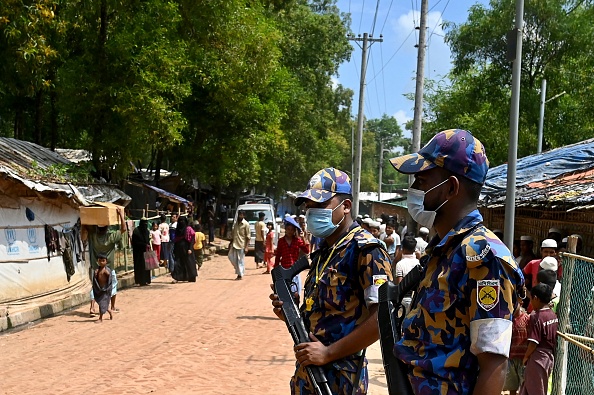Bangladesh arrests brother of Rohingya armed group leader

The arrest of the ARSA member is the most high-profile since the group was accused of murdering influential Rohingya community leader Mohibullah.
Bangladesh police have arrested the brother of a notorious rebel leader whose organisation has been blamed for murders and drug trafficking in Rohingya refugee camps.
Mohammad Shah Ali was arrested late on Saturday by the elite Armed Police Battalion. He is the half-brother of Ataullah Abu Ammar Jununi, the leader of the Arakan Rohingya Salvation Army (ARSA) armed group.
Commanding officer Naimul Haque told the AFP news agency that Ali had admitted his links with ARSA and that “Ataullah was in regular contact with him”.
He also said police had rescued one person kidnapped by Ali, without giving further details.
The country is home to about 850,000 members of the stateless mostly-Muslim minority, who live in overcrowded settlements after fleeing systemic discrimination and violence in neighbouring Myanmar.
Rohingya refugees are caught in the middle of violence by armed groups within the community and a police crackdown.
ARSA, formerly known as Harakatul Yakeen, says it is fighting on behalf of the dispossessed Rohingya community, which has been denied the most basic rights, including citizenship.
Myanmar authorities have accused its group members of being Muslim “terrorists”.
ARSA first emerged in October 2016 when it attacked three police outposts in the Maungdaw and Rathedaung townships in Myanmar, killing nine police officers.
Arakan is another term for Rakhine, the western state of Myanmar where most of the country’s 800,000 Rohingya live.
Mohammad Salim, a Rohingya refugee living in Nouakar Mat camp, welcomed Ali’s arrest. “Everyone here is terrified by him,” Salim told AFP. “[He] used to oppress us.”
Ali’s capture was the most high-profile arrest of an ARSA member since the group was accused of murdering influential Rohingya community leader Mohibullah in September and killing seven others at an Islamic seminary soon after.
Bangladesh authorities launched a dragnet in the camps after the murders, arresting hundreds of people.
Tom Andrews, the United Nations special rapporteur for Myanmar, visited the camps last month and blamed ARSA for much of the crime committed there.
There was no immediate comment from ARSA on Saturday’s arrest.
Amnesty International has urged a thorough investigation into Mohibullah’s death and for the Bangladeshi authorities and the UN refugee agency to work together to ensure the protection of people living in the camps, which the group said were facing an “increasing problem” of violence often linked to the control of illicit drugs.
Invited to the White House and to speak to the UN Human Rights Council, Mohibullah was one of the most high-profile advocates for the Rohingya, whose treatment is now the subject of a genocide investigation in The Hague.
ARSA leader Ataullah has denied the group’s involvement in the drug trade, instead accusing Bangladesh authorities of trafficking methamphetamine pills and blaming Rohingya refugees.
The group has also rejected accusations of having links with al-Qaeda, ISIL (ISIS) or other armed groups.






